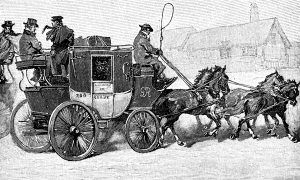
Stagecoach on the Overland Trail near Laramie, Wyoming.
By William Daugherty, for the Reno Evening Gazette in 1891
The closing days of the great Overland Stage line, inaugurated by Ben Holladay, were in many respects, the most prosperous and interesting in its history. The line was purchased from him by Wells, Fargo & Co. in 1867 under the impression that it was, on account of the mail subsidy, a paying concern. But, the new purchasers soon found a different state of affairs existing, and instead of dividends, the assessments that loomed up soon affected their stock, and within a year, it was quoted in the New York stock boards at 37 cents on a par value of 100. The subsidy paid by the government of $3,000,000 a year was more than absorbed by the heavy expenses of operating the line and added to this, was the fact that the Pacific railroads were being pushed to completion, and soon, the rolling stock of the stage company would be valueless.
The history of its final windup will not be repeated here, but the fact was well known to the pioneers, that had it not been for some shrewd manipulation whereby Wells, Fargo & Co.. secured a 20 years lease over the lines of the Central Pacific Railroad the company would have passed out of existence. As was stated at the opening of this sketch the last days of the overland were its greatest.
Travel increased from various causes, and Harry Mountfort, the Sacramento agent, had the pleasure of seeing many waybills with a full passenger list booked in San Francisco and started from Sacramento by him for the long trip to Omaha. The McLane management of the line was liberal in the extreme; high salaries were the rule, and the most accomplished agents and skillful drivers were employed, and $300 a month as a salary secured crack whips whose names are as familiar to the pioneers as are the statesmen of the present day. It is not the intention to here make personal mention of the many popular names associated with the memories of those prosperous days of the great Overland Stage times, as this introduction is only preliminary to the fact of the great popularity of the line, which also enjoyed the confidence of the public to an extent that gave it the well-deserved reputation of old reliability. An illustration of this, the writer recalls an incident that occurred during the fall of 1868, when the rush to White Pine began and caused rival lines to enter the field from Austin eastward. For some time Wells, Fargo & Co. made no effort to secure the trade and continued running on the old overland road that ran north of the district where the travel was headed for. But as it increased the company diverted from the old route and ran directly to the mecca.
That was attracting the surplus population of the Pacific coast. This was an irresistible result, for the stampede to White Pine was considered the greatest silver excitement known in modern times while it lasted, and the trade was well worth enjoying.
The road from Austin led by the present town of Eureka and across the Diamond Mountains, and along this part of it, the grade was not then completed. The stages were always loaded heavily on top with express freight, and it was usual for passengers to walk a great part of the way up Diamond Mountain, for the loads were too heavy for the teams. As this was the custom with the rival lines on the same road, no one ever objected, for people were eager to make speed. On one occasion, however, Wells, Fargo & Co.’s coach contained a grouty old passenger who refused to get out and walk on the ride up the mountain. The driver told him all right, but if he would ride he must take the chances and proceed slowly up the hill. The other passengers were all ahead climbing the hill and creating an appetite for the coming breakfast when a crash was heard.
Then, the stage was seen to slowly roll over on its side, caused by the shelving grade and top-heavy load. The passengers hastened back to help the driver and were busied at once in extricating the passenger who was imprisoned in the wreck and moaning in great distress. He was finally released and offers of friendly assistance were numerous. An examination disclosed the fact that no bones were broken, but he seemed in great mental distress, and to relieve him, the passengers assured him he was all right. He was told to brace up, and the bottle was pressed upon him as he composed himself for a final shaking together, he disclosed the cause of his mental perturbation, by explaining, that the agent assured him when he bought his ticket “that this line never upset.”
By William Daugherty article in the Reno Evening Gazette, February 25, 1891. Compiled and edited by Kathy Weiser/Legends of America, updated June 2021.
About the Author: Written by William Daugherty, for the Reno Evening Gazette in 1891. The Reno Evening Gazette was first published on October 12, 1876, and continued for the next 107 years. In 1977, it was merged with the Nevada State Journal and continues to exist today as the Reno Gazette-Journal.
Also See:
Pioneers on the Nevada Frontier (Reno Evening Gazette)
Nevada Mining Tales (Reno Evening Gazette)
Pioche Land Jumpers and the Death of Jack Harris (Reno Evening Gazette)
Stagecoaches of the American West
Violence on the Nevada Frontier (Reno Evening Gazette)

